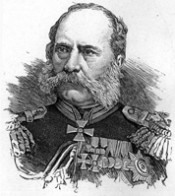
Birthday of Alexander Ivanovich Baryatinskiy, Russian state and military man, prince, general field marshal
2 (14) May 1815 at Ivanovskoye estate, Kursk Province, in the family of a Russian diplomat, was born Alexander Baryatinskiy, Russian statesman and military leader, Prince, Field Marshal (1859), a member of the State Council (1860), the hero of the Caucasian War (1817 - 1864).
Baryatinskiy belonged to an ancient princely family, the circle of the highest aristocracy of the Russian Empire. According to legend, Princes Baryatinskiys descended from Michael Vsevolodovich, Prince of Perejaslavsl, Novgorod, Chernigov and Galicia. Grandfather of A. I. Bariatinskii, Ivan Sergeevich, was one of the tutors of the heir to the throne Paul Petrovich.
Baryatinskiy received an excellent education at home, but after moving to Moscow in 1831, he entered the school of Guards Ensigns and Cavalry Cadets. After graduation he became a cornet in the Life Cuirassier Regiment. In 1835, a young cavalry officer was sent to the Caucasus, where he commanded Cossack squadrons, distinguished himself in battle with the Highlanders, was severely wounded to his right side. During the fighting in the Caucasus Baryatinskiy was awarded a gold sword with the inscription "For Bravery". Upon returning to St. Petersburg, he became adjutant of the heir to the throne, Grand Duke Alexander Nikolaevich. During the three-year journey with the heir to Western Europe, he collected a rich library.
In 1845 Baryatinskiy led the battalion in Dargwa expedition against the Highlanders, during which he was wounded in the right leg. A year later he took command of the Kabardian Jäger Regiment, distinguished himself by taking the village of Gergebil (1848), for which he was promoted to major general and enlisted in the retinue of His Imperial Majesty.
From 1850 Baryatinskiy became commander of the brigade, and from 1851 - the division. He led an active and vigorous assault on Chechnya, making systemic attacks, which were also accompanied by the laying of new roads and forest glades, organization of administrative management of villages. Baryatinskiy proposed a series of social measures to maintain order among the local population. For successful expedition in Chechnya (1852-1853) he was promoted to lieutenant general and appointed Chief of Staff of the Caucasian Corps. When Alexander II ascended the throne Baryatinskiy was appointed governor-general of the Caucasus, with unlimited powers.
During the Crimean War (1853-1856) Prince Baryatinsky headed headquarters of Caucasian Corps, distinguished himself by defeating the Turks at Kyuryuk Dara, for which he was awarded the Order of St. George 3rd degree. In 1856, being at the head of the Reserve Guards Corps, the prince submitted a few projects of the complete conquest of mountain dwellers and was appointed commander of a detached Caucasian Corps, fulfilling the duties of general-governor in the Caucasus.
Baryatinskiy continued and developed on the basis of his own experience the tactics employed by General A. P. Ermolov. Three-year program developed by the Caucasian viceroy included vigorous and decisive actions in 3 areas of Chechnya. As a result, in early 1859 troops of the mountain dwellers’ Head Shamil were forced out of Chechnya and Dagestan, and the fall of 1859 Shamil surrendered in the village of Gunib.
For his success in the Caucasus Baryatinskiy was awarded the Order of St. George, 2nd degree, St. Andrew, the honorary title of chief of Kabardian Regiment, as well as the rank of General Field Marshal. Having taken under his guardianship new territory, the Caucasian viceroy implemented series of measures aimed at introducing new forms of governing the region, the development of farming, the spread of Christianity.
In 1860, for health reasons Baryatinskiy went on vacation overseas, and two years later at his own request resigned. Upon his discharge, he became a member of the State Council, retaining the favor of the emperor. The prince continued to take interest in military and political issues, expressing genuine opinions. In connection with the military reforms of 1860-1870 he entered into argument with the Minister of War D. A. Milyutin. While living abroad, the Prince repeatedly offered suggestions on a number of military issues, but all of them were rejected by the environment of the Emperor.
In spring of 1879, aged 63 years, Prince Alexander Baryatinskiy died in Geneva. According to his will, the body was transported to Russia and buried in the family estate - the village of Ivanovskoye, Kursk Province.
Lit.: Барятинский А. И. Отчёт наместника кавказского и главнокомандующего Кавказскою армией 1857, 1858, 1859. Тифлис, 1861; Барятинский Александр Иванович // Отечественная история: энциклопедия: В 5 т. Т. 1. М., 1994. С. 171-172; Зиссерман А. Л. Фельдмаршал князь Александр Иванович Барятинский. 1815-1879. Т. 1-3. М., 1888-1891; Коломиец А. Александр Иванович Барятинский: О генерал-фельдмаршале, участнике Кавказской войны 1817-64 гг. // Родина. 1994. № 3-4. С. 46-48; Муханов В. М. Генерал-фельдмаршал князь А. И. Барятинский: Жизненный путь, военно-административная и общественная деятельность: автореф. дис. ... к. и. н. М., 2005; Муханов В. М. Покоритель Кавказа князь А. И. Барятинский. М., 2007; Муханов В. М., Запальский Г. М. Письма императора Александра II князю А. И. Барятинскому (1857-1864 гг.) как источник по истории Российской Империи в середине XIX в. [Электронный ресурс] // Московский Государственный Университет имени М.В. Ломоносова. 1997-2013. URL: http://www.hist.msu.ru/Science/Conf/lomweb01/zapalsk.htm; Род князей Барятинских: Исторический очерк. Л., 1990; Романовский Д. И. Генерал-фельдмаршал князь Александр Иванович Барятинский и Кавказская война. 1815-1879 // Русская старина. 1881. Т. 30. № 2; Федорченко В. И. Барятинский Александр Иванович // Императорский Дом. Выдающиеся сановники: Энциклопедия биографий. Красноярск, 2003. Т. 1. С. 101-102.
Based on the Presidential Library’s materials:

